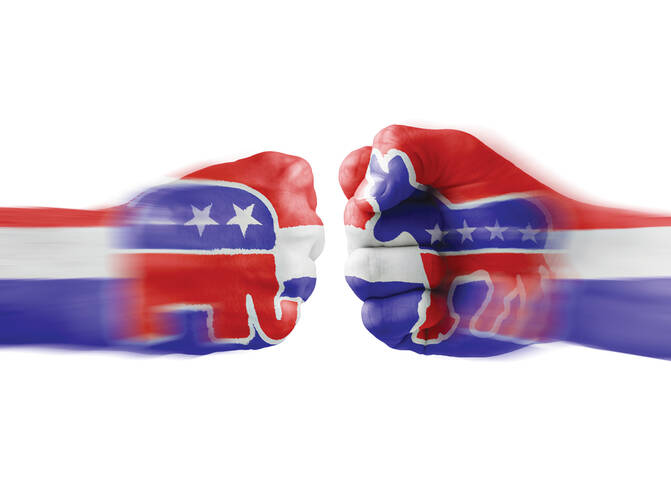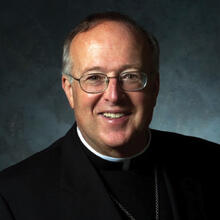Catholic teaching views the vocation of politics as a vital element in building up the kingdom of God on earth. Democracy is not merely a set of empty procedures, but instead a way to promote the dignity of the human person, respect for human rights and commitment to the common good. For this reason, both the vocation of citizenship and that of political leadership are deeply moral identities. They are rooted in the commitment to seek solutions to society’s deepest problems; they seek to put power into practice as service. As Pope Francis noted last September, “politics, according to the social doctrine of the church, is one of the highest forms of charity, because it serves the common good in humility and love.”
This vision of political life centers upon the concept of the common good, which the Second Vatican Council described as “the sum total of social conditions which allow people, either as groups or as individuals, to reach their fulfillment more fully and more easily.” In seeking the common good, “every group must take into account the needs and legitimate aspirations of every other group, and still more, of the human family as a whole.”
But how can this deeply moral vocation of politics be carried out by citizens and political leaders in an intensely partisan age? What are the dilemmas of party and conscience that political leaders must grapple with as they attempt to serve their constituents and the nation as a whole? Can parties effectively promote the dignity of the human person and the advancement of government? Only by understanding the moral identity of political parties themselves and their relation to the common good can both citizens and public officials exercise their partisan identities in a way that respects their moral identities.
For many of our nation’s founders, political parties or factions, as they preferred to call them, were antithetical to the pursuit of the common good. For them, the concept of faction was rooted in the effort to formulate public policy around the views and interests of one segment of the American people over another. Parties were necessarily divisive—in their worldviews, their political structures and their objectives. In an age like our own, when partisan divides seem so often to hobble public policy rather than advance it, the echoes of these early American critics of partisanship in American politics raise the perennial question of whether parties truly serve the democratic process or impede it.
Yet in the most important crises in our nation’s history, political party structures have transformed and advanced the common good in profound ways. In 1860 the Republican Party of “free soil, free labor and free men” cobbled together the coalition that elected Abraham Lincoln and forced the United States to confront the continuation of slavery, that original sin of the U.S. Constitution. And in the wake of the Great Depression, the Democratic coalition transformed the nature of the federal government in order to erect a social safety net that reached across the United States with jobs and food and electricity.
The moral achievements of party structures are also apparent in the moments in our nation’s history when bipartisan action has led to revolutions that monumentally advanced the common good and basic human dignity. The progressive reforms that emerged from the Republicanism of Theodore Roosevelt and the Democratic politics of Woodrow Wilson, and the bipartisan coalition that wrought the Civil Rights Acts in the 1960s, testify to the reality that party structures can produce a level of moral cooperation that propels the common good of society even as it reflects party identity.
A Vital Role for Parties
Catholic social teaching envisions a vital role for political parties in the advancement of politics and the common good. In the words of the Vatican’s Compendium of the Social Doctrine of the Church, “Political parties have the task of fostering widespread participation and making public responsibilities accessible to all. Political parties are called to interpret the aspirations of civil society, orienting them towards the common good, offering citizens the effective possibility of contributing to the formulation of political choices.”
In a very real way, political parties at their best have the capacity to embody all four core principles of the church’s social doctrine. Parties reflect the principle of subsidiarity because they reach down into all levels of society and seek to invite citizens into the political process. They reflect the principle of solidarity because they seek to bond citizens together in civic action and participation. Parties seek to advance the principle of the common good by promoting the well-being of society as a whole. And they can enhance human dignity by bringing laws and governance into greater conformity with the demands of human rights.
But if the capacity of parties to generate and sustain widespread political participation and produce reforms in public policy have often made parties a beneficial element of American politics, the excesses of political partisanship make it essential that both citizens and public officials have a strictly conditioned fidelity to their party identity. Party structures accelerate the tendency to value victory over compromise, electoral advantage over substantive accomplishment and power over principle. Party structures can at times deliberately call upon legislators to place partisan loyalties above the common good in the hope of attaining partisan advantage. Even more frequently, party pressures can distort citizens’ and legislators’ very comprehension of the common good, because the common good gets lost amid party ideology.
For Catholic social teaching, the current structure of American political parties bisects the common good. The Republican Party better reflects the commitment to protect unborn life, reject euthanasia and promote religious liberty. The Democratic Party witnesses more effectively to Catholic teaching on the issues of poverty and inequality, immigration reform, restorative justice and the environment.
On the critical question of family life, each party reflects certain key elements of the core common good, while on the issues of the radical need to address global poverty and the fundamental question of the role of warfare in American foreign policy, neither party embodies even an acceptable threshold commitment to achieving the Catholic vision of justice and peace in the world.
The commitment to the protection of human life from conception to natural death and the option for the poor are particularly important principles for those seeking to guard the dignity of the human person in our highly partisan environment. This importance flows from the central identity of these two commitments as elements of human dignity. It is compounded by the reality that the rejection of protections for unborn life has become a virtual litmus test for Democratic leadership in the United States, while rejection of the rightful role of government in the protection of the poor has become a virtual litmus test for Republican identity.
For all these reasons, voters and public officials who are informed by a Catholic conception of the common good are inevitably left in a continuing state of conditioned commitment to their party’s agenda, no matter which party they belong to today. They are called to embrace those elements of party life that contribute to the common good. They are called to deepen the ability of their party to elicit and promote broad participation by citizens in the political life of the nation. But equally they are called to act as insurgents within their own party to bring that party’s positions into closer conjunction with the deeply moral vision of advancing the dignity of the human person.
Principles for the Common Good
The following five principles constitute guideposts for fostering party structures that reflect a moral commitment to the common good.
1) Political parties, in their core moral identity, are called to nourish the broad and meaningful participation of citizens in the formulation of public policy choices and the selection of candidates. There is no greater service that parties can render than to bring more Americans directly and meaningfully into the political process. Actions that deliberately limit participation for electoral gain are morally unacceptable and should be politically unacceptable.
2) The political culture of our nation should not only allow public officials to make policy choices of conscience that are at variance with their party’s position, but should also recognize such moments of conscience as a mark of leadership and devotion to public service, rather than a failure of loyalty to party. A political culture that respects the courage of conscience will improve both the quality of its leaders and the quality of its laws.
3) Parties must show more concern for governance than for ideological warfare. It is impossible to pursue the common good if patterns of fundamental governance are destroyed by partisan battles. And the millennial generation is unlikely to enter any world of party structures where a budget cannot be passed or vital offices filled because of partisan strife.
4) There is great social peril in the fact that today our party structure is sharply divided along lines of race and ethnicity. This is not a new development in American politics, of course, but it strikes at the very heart of the Catholic principle of solidarity. Both political parties have a deep responsibility to minimize and assuage these racial and ethnic divisions and not to exacerbate them for electoral benefit.
5) Parties must find pathways to overcome and transform the pressures to be dominated by money. The pursuit of the common good is both a substantive endeavor and a highly symbolic one. The current role of money in our partisan and political life is a threat on both levels because it effectively erects two classes of citizens and distorts the lens through which political leaders fashion public policy.
In “The Joy of the Gospel,” Pope Francis wrote, “I ask God to give us more politicians capable of sincere and effective dialogue aimed at healing the deepest roots, and not simply the appearances of the evils in our world.” Let us pray and work to reform our political parties with that same aim.








